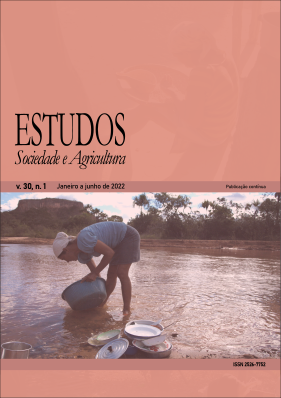Agroecological territorializations: knowledge, practices, and policies related to nature in traditional rural communities in Paraná
DOI:
https://doi.org/10.36920/esa-v30n1-3Keywords:
agroecology, socio-environmental autonomy, nature policies, territorializationAbstract
This text discusses some results from research on the formation of agroecological networks and subjects in traditional rural communities in the Center-South and Campos Gerais regions of Paraná state. We begin from the discussion of agroecology as a field for social production of knowledge and practices, through which cooperation strategies, disputes, and tensions between different actors at local, regional, and national scales become evident. To do so, three dimensions that mobilize resources and expand capacities for a relative socio-environmental autonomy that theoretically could be driven by agroecological projects are discussed: organizational, epistemological, and technological. A wide variety of social strategies for appropriating, producing, and legitimizing agroecological discourses and practices that reveal territorialization strategies for multiple motives (local social organizations, universities, unions and cooperatives, municipal, state, and federal government) can be seen. Notable among the competing agroecological imagery is that which resembles an ethics of peasantry and traditional knowledge, often diverging from the official scientific and institutional hegemonic beliefs in some aspects with regard to the autonomy of the three dimensions mentioned above. On these terms, we question to what extent various agroecological practices and imagery can mobilize social and ecological capital when appropriated (adapted and hybridized) by local rural communities in order to produce subjectivities and autonomies based on an ethics of peasantry.
elocation-id: e2230103
Received: 08.24.2021 • Accepted: 02.04.2022 • Published: 02.23.2022
Original article / Blind peer review / Open access
Downloads
Downloads
Published
Issue
Section
License
Copyright (c) 2022 Nicolas Floriani, Dimas Floriani, Adnilson de Almeida Silva, Antonio Marcio Haliski

This work is licensed under a Creative Commons Attribution 4.0 International License.
Authors who publish in this journal agree to the following terms:
a) Authors maintain the copyright and grant the journal the right of first publication, with the work simultaneously licensed under the Creative Commons Attribution License which allows the sharing of the work with acknowledgment of authorship and initial publication in this journal.
b) Authors are authorized to take additional contracts separately, for non-exclusive distribution of the version of the work published in this journal (eg publish in institutional repository or as a book chapter), with acknowledgment of authorship and initial publication in this journal.
c) Authors are allowed and encouraged to publish and distribute their work online (eg in institutional repositories or on their personal page) at any point before or during the editorial process, as this can generate productive changes, as well as increase the impact and citation of published work (See The Effect of Free Access).






